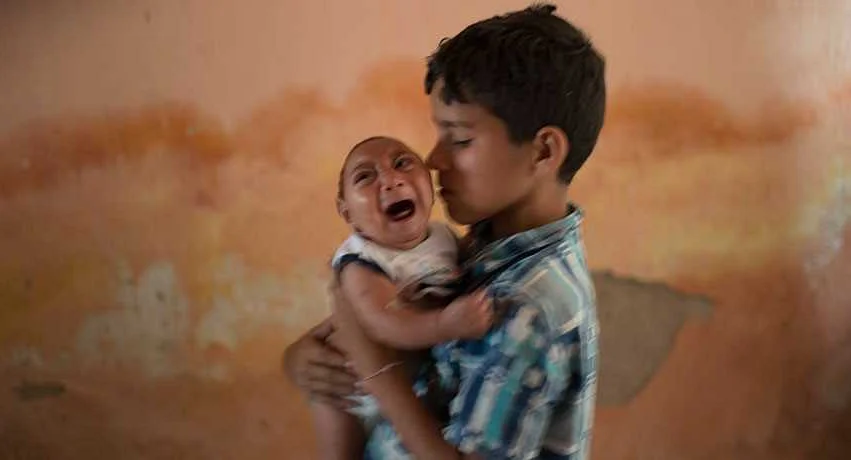Five Russians brought Zika fever from the Dominican Republic
Read about five Russians who brought Zika fever back from their trip to the Dominican Republic. Find out the symptoms, risks, and prevention methods for Zika virus.
Concerns over the Zika virus continue to escalate as five Russian tourists have contracted the mosquito-borne disease during their stay in the Dominican Republic. With the number of reported cases on the rise, health officials have issued an outbreak alert, urging travelers to take necessary precautions when visiting affected regions.
The Zika virus, which is primarily transmitted through the bite of an infected Aedes mosquito, has been linked to severe birth defects, including microcephaly, in newborns. Symptoms of the virus include fever, joint pain, rash, and conjunctivitis. While most individuals experience mild symptoms or none at all, pregnant women are at the highest risk of complications.
According to the Russian health authorities, the infected tourists had returned from their vacation with flu-like symptoms and were later diagnosed with Zika fever. The officials have advised anyone who has recently traveled to the Dominican Republic to monitor their health closely and seek medical attention if they develop any of the symptoms associated with the virus.
In response to the outbreak, the Dominican Republic has intensified its efforts to control the spread of the Zika virus. Health officials are actively promoting mosquito control measures, such as eliminating breeding sites and using insect repellent. Additionally, travelers are advised to wear long-sleeved clothing and use bed nets to reduce the risk of mosquito bites.
As the Zika virus continues to spread, health organizations worldwide are working diligently to develop a vaccine and improve diagnostic tools. In the meantime, it is crucial for individuals to stay informed about the outbreak, follow recommended precautions, and seek medical attention if necessary. With concerted efforts, it is hoped that the spread of the Zika virus can be contained and the health of individuals protected.
Five Russians Diagnosed with Zika Fever in Dominican Republic

Five Russian tourists have been diagnosed with Zika fever after visiting the Dominican Republic. The outbreak of the Zika virus has become a cause for concern as it continues to spread across different parts of the world.
Zika fever is a mosquito-borne illness that is primarily transmitted through the bite of an infected Aedes mosquito. The virus can also be transmitted through sexual contact and from mother to child during pregnancy. Symptoms of Zika fever include fever, rash, joint pain, and conjunctivitis. In most cases, the infection is mild and lasts for a few days to a week. However, there have been reports of severe complications, such as microcephaly in babies born to mothers infected with Zika during pregnancy.
The affected Russians were part of a group of tourists who had traveled to the Dominican Republic for vacation. Upon their return, they started experiencing symptoms and sought medical attention. Laboratory tests confirmed that they had contracted Zika fever.
Health officials are now working to trace and identify other individuals who may have come into contact with the infected tourists. They are urging anyone who may have been in close proximity to the affected individuals to seek medical attention if they experience any symptoms.
Precautionary measures, such as wearing insect repellent, using mosquito nets, and practicing safe sexual behaviors, are being emphasized to prevent further spread of the Zika virus. The Dominican Republic’s Ministry of Health is also taking steps to control the mosquito population and educate the public about the risks associated with Zika fever.
Travelers are advised to check the latest travel advisories and take necessary precautions before visiting areas affected by Zika fever. It is recommended to consult a healthcare professional for personalized advice based on individual circumstances.
As the global health community continues to monitor the spread of Zika fever, it is crucial to stay informed and take appropriate measures to protect oneself and others from this emerging public health threat.
Russian Government Issues Outbreak Alert

The Russian government has issued an outbreak alert following the news that five Russians have contracted Zika fever during their recent trip to the Dominican Republic. The Ministry of Health has urged all citizens who have traveled to affected areas to seek medical attention if they experience any symptoms associated with Zika virus infection.
In response to the outbreak, the Russian government has implemented various measures to prevent the further spread of the virus. These include increased surveillance at ports of entry, enhanced mosquito control efforts, and public awareness campaigns to educate the population about the risks and prevention of Zika virus infection.
The Ministry of Health has also recommended that pregnant women avoid traveling to countries with ongoing Zika virus transmission, as the virus has been linked to severe birth defects such as microcephaly. Additionally, the government is working closely with healthcare providers to ensure the availability of diagnostic tests and treatment options for individuals suspected of Zika infection.
| 1. Zika virus is primarily transmitted through mosquito bites. | – Use insect repellent containing DEET. – Wear long-sleeved shirts and pants. – Use mosquito nets and screens. – Eliminate mosquito breeding sites. |
| 2. Zika virus can also be transmitted through sexual contact. | – Practice safe sex or abstain from sexual activity if you or your partner has traveled to an affected area. – Use condoms correctly and consistently. |
| 3. Zika virus infection during pregnancy can cause severe birth defects. | – Pregnant women should avoid traveling to affected areas. – Discuss travel plans with healthcare providers. – Follow strict mosquito bite prevention measures. |
The Russian government is closely monitoring the situation and will continue to take necessary actions to protect the health and well-being of its citizens. It is essential for individuals traveling to or from affected areas to stay informed about the latest updates and follow the recommendations of the authorities.
Zika Fever Symptoms and Risks
Zika fever is caused by the Zika virus, which is primarily transmitted to humans through the bite of infected mosquitoes. The symptoms of Zika fever are usually mild and include fever, rash, joint pain, and red eyes. However, the virus can cause more serious complications, especially in pregnant women.
Pregnant women who contract the Zika virus are at risk of giving birth to babies with birth defects, such as microcephaly, a condition characterized by an abnormally small head and incomplete brain development. The virus can also be passed from a pregnant woman to her fetus during pregnancy or childbirth.
Other risks associated with Zika fever include the potential for neurological complications, such as Guillain-Barré syndrome, a rare disorder that can cause muscle weakness and paralysis. It is important to note that not everyone infected with the Zika virus will develop symptoms, and the symptoms typically last for several days to a week.
Prevention is key in avoiding Zika fever. Individuals traveling to areas with ongoing Zika virus transmission should take precautions to prevent mosquito bites, such as wearing long-sleeved shirts and long pants, using insect repellent, and staying in air-conditioned or screened-in areas. Pregnant women should consider postponing travel to areas with high levels of Zika virus transmission.
If you experience any symptoms of Zika fever or have recently traveled to an area with ongoing transmission, it is important to seek medical attention for diagnosis and proper management of the infection.
Preventive Measures Against Zika Fever
1. Use insect repellent: Apply insect repellent containing DEET, picaridin, IR3535, or oil of lemon eucalyptus to exposed skin and clothing. Reapply as directed.
2. Wear protective clothing: Cover as much of your body as possible by wearing long-sleeved shirts, long pants, and socks. Choose clothing treated with permethrin to provide additional protection.
3. Stay in air-conditioned or screened-in areas: Use air conditioning or window and door screens to keep mosquitoes outside. If possible, sleep under a mosquito net, especially during daytime hours when Aedes mosquitoes are most active.
4. Eliminate standing water: Mosquitoes breed in standing water, so empty and clean any containers that can hold water, such as flower pots, bird baths, and gutters. Keep swimming pools, hot tubs, and spas well maintained and properly chlorinated.
5. Practice safe sex: Zika virus can be sexually transmitted, so use condoms correctly and consistently, especially if your partner has traveled to an area with Zika or has been diagnosed with the virus.
6. Stay informed: Stay updated on travel advisories and follow recommendations from health authorities. Be aware of the symptoms of Zika fever and seek medical attention if you experience any of them after traveling to an affected area.
Note: Pregnant women and couples planning to become pregnant should take extra precautions and consult with a healthcare provider before traveling to areas with Zika virus transmission.
Zika Fever Treatment and Recovery

There is currently no specific treatment for Zika fever. The primary goal of treatment is to relieve symptoms and manage complications, if any arise. Most people infected with the Zika virus experience mild symptoms and recover fully without any medical intervention.
It is recommended that individuals with Zika fever get plenty of rest, drink fluids to prevent dehydration, and take over-the-counter pain relievers such as acetaminophen to reduce fever and relieve joint pain. Non-steroidal anti-inflammatory drugs (NSAIDs) like ibuprofen should be avoided until dengue fever is ruled out to reduce the risk of bleeding.
Additionally, it is crucial for individuals with Zika fever to avoid mosquito bites during the time they are infected, as they can transmit the virus to other people through mosquitoes.
In some cases, severe symptoms or complications may require hospitalization. Pregnant women who are infected with Zika virus should seek medical care immediately, as the virus has been linked to birth defects, such as microcephaly, in babies born to infected mothers.
Recovery from Zika fever is generally quick, with symptoms typically lasting a few days to a week. However, it is important for individuals to continue following preventive measures, such as using insect repellent and wearing protective clothing, to avoid re-infection and prevent the spread of the virus to others.
| – Fever | – Guillain-Barré syndrome |
| – Rash | – Birth defects in unborn babies |
| – Joint and muscle pain | – Eye problems |
| – Headache | |
| – Conjunctivitis |
If you or someone you know is experiencing symptoms of Zika fever, it is important to seek medical advice and follow the recommendations of healthcare professionals. Taking necessary precautions and staying informed about the latest updates on the Zika virus can help prevent its spread and protect individuals and communities.